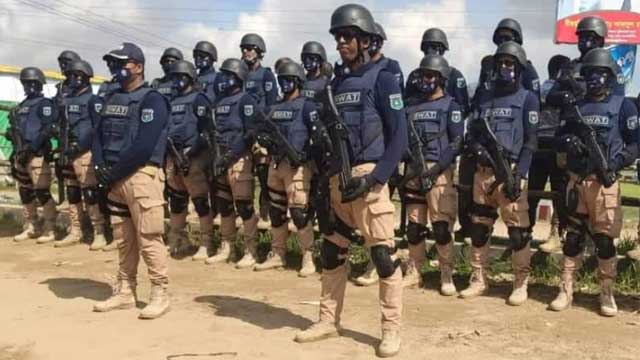The United States in their counter-terrorism report 2022 on Bangladesh said that apart from the Rapid Action Battalion, the Special Weapons and Tactics Division of the Dhaka Metropolitan Police is also ‘ineligible’ for any assistance owing to human rights violations.
The US State Department’s report which was released on Saturday also alleged that the US-trained Bangladesh police units arrested dozens of ‘terrorist suspects’ in 2022, but ‘other elements of the security forces have conducted extrajudicial killings and committed other human rights violations’.
‘Radicalisation to violence and terrorist recruitment in the prison system remained a serious concern,’ the State Department added.
The report, however, stated that Bangladesh cooperated with the United States to strengthen its internal security and response to terrorism, and the US government provided various forms of assistance to the CTTC unit of the DMP, the Anti-Terrorism Unit, and other police units around the country.
The SWAT, according to its founding members, was established in 2009 as part of the DMP’s Detective Branch with the police commissioner at the helm.
Mishuk Chakma, deputy commissioner for Special Action Group at the CTTC, admitted that all of his wings except the SWAT are getting all kinds of assistance from the US.
It is not clear though when and how the SWAT was named under the Leahy-related restrictions, as mentioned in the report, but a SWAT commander confirmed that he received training facilitated by the the US until 2016.
The Leahy Laws or Leahy amendments are the US human rights laws that prohibit their Department of State and Department of Defense from providing military assistance to foreign security force units that violate human rights with impunity.
The SWAT grabbed spotlight in 2022 when one of its group was seen with automatic rifles and Armed Personnel Vehicle parading in a move to courter the opposition rally in Dhaka.
The US-trained SWAT later was brought under the CTTC which was created in 2016. It has conducted numerous operations under the CTTC since then.
The US also provided the SWAT equipment, including M4 carbines, SR-25/AR-10 sniper rifles and Glock 17 pistols.
In 2017, according to the US embassy in Dhaka, their Bureau of Diplomatic Security Anti-terrorism Assistance Program provided 42 SWAT instructors with training under two refresher Crisis Response Team courses, covering over seven weeks.
In the latest counter-terrorism report, the US State Department said that in 2022, Bangladesh experienced fewer instances of terrorism violence as the authorities continued to pursue militants rigorously, particularly al-Qa’ida-affiliated groups, Jamaat-ul-Mujahideen and an ISIS-affiliated JMB offshoot, ‘Neo-JMB’.
In last October, Bangladesh authorities announced operations to disrupt Jama’atul Ansar Fil Hindal Sharqiya, an allegedly al-Qa’ida inspired group.
The report read that ‘the Bangladeshi counterterrorism RAB announced operations to disrupt Sharqiya, an allegedly al-Qa’ida-inspired group training in the Chittagong Hill Tracts to carry out attacks elsewhere’.
Bangladeshi authorities, the report stated, alleged that Sharqiya cooperated with the Kuki-Chin National Front, an ethnic separatist militant organization.
Authorities announced the arrest of dozens of Sharqiya members throughout the rest of the year, stated the US counter-terrorism report.
It further mentioned that the Directorate General of Forces Intelligence’s Counterterrorism Investigation Bureau, Border Guard Bangladesh, the Special Branch of police, Aviation Security, the Airport Immigration Police, and the Airport Armed Police Battalion worked independently.
Bangladesh shares information with INTERPOL but has no national terrorist watchlist, according to the US report.
Special Branch has its own internal watchlist that provides read-only privileges to the Directorate General of Forces Intelligence and the Directorate General of National Security Intelligence, it said.
A US ‘Alert List’ project remains under government consideration, which would be led by Special Branch in coordination with ATU, CTTCU, and Metropolitan Police, the report further read.
Bangladesh does not systematically use Advance Passenger Information or Passenger Name Record data to screen travellers before flights arrive, the report added.
It said that Bangladeshi officials publicly highlighted the potential of refugee radicalisation to increase terrorist group recruitment and violence but no information emerged about significant terrorist threats from the camps in 2022.
The report also stated that Bangladeshi organisations continued cooperative activities through the Country Support Mechanism under the Global Community Engagement and Resilience Fund, though activities likely will wind down soon.





